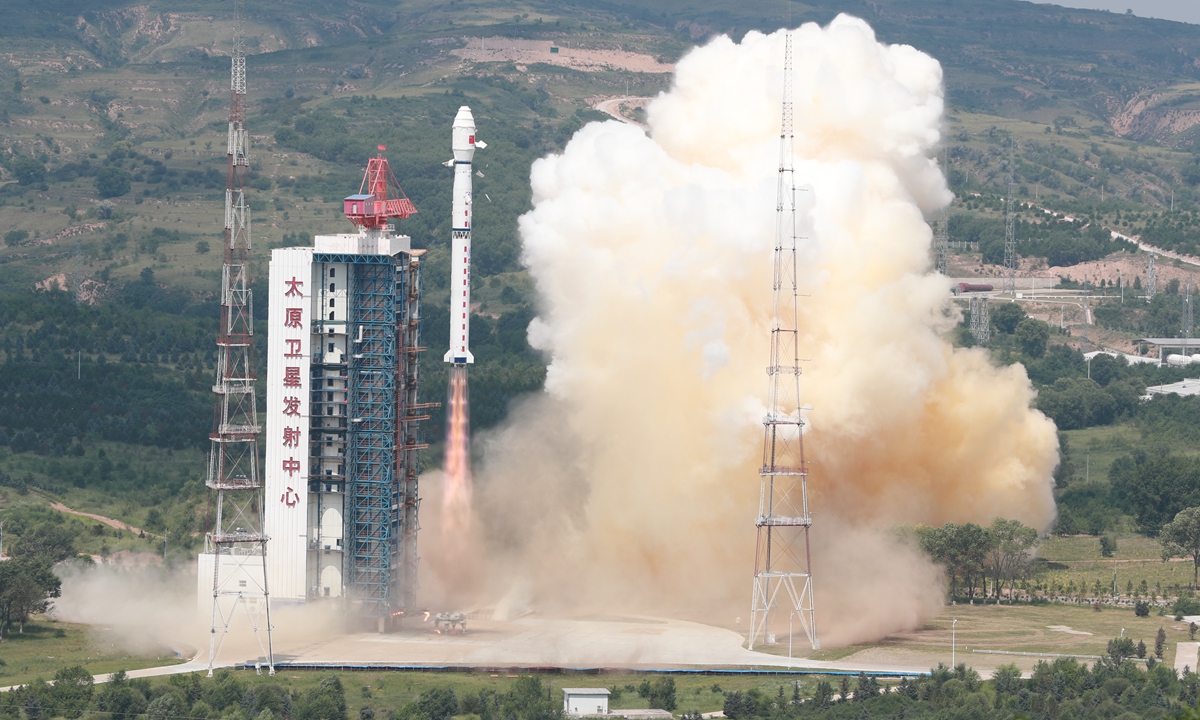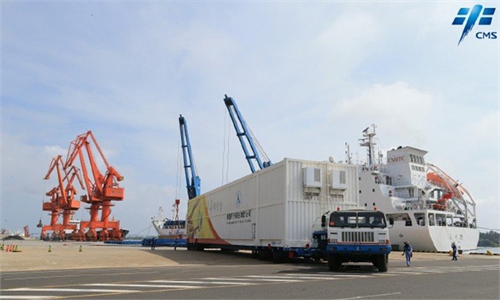China hails its carrier rocket family’s 100th consecutive successful launch as US space debris falls on Australian farmland

China launches its terrestrial ecosystem carbon monitoring satellite, which was sent into preset orbit via a Long March-4B carrier rocket on August 4, 2022, the world's first joint active-passive observation remote sensing satellite for forest carbon sink.Photo; VCG
With China's successful launch of the terrestrial ecosystem carbon monitoring satellite, which was sent into preset orbit via a Long March-4B carrier rocket on Thursday, the world's first joint active-passive observation remote sensing satellite for forest carbon sink has been officially put into operation.
Thursday's launch also marked the 100th consecutive successful launch of China's Long March family of launch vehicles since the grand debut of the heavy-lift Long March-5B in May, 2020. Since Long March-5B's debut, NASA has relentlessly hyped the "risk" of space debris brought by the carrier rocket with the aim of compromising China's space achievements, when the US itself poses greater dangers to the world as SpaceX craft have hit farms on the ground on two occasions in the past two years.
The satellite was developed by China Academy of Space Technology under the state-owned space giant China Aerospace Science and Technology Corp over a period of 10 years, China News Service reported on Thursday, and its launch marked China's carbon sink monitoring entering the era of remote sensing.
It will be widely used in terrestrial ecosystem carbon monitoring, terrestrial resource surveys, evaluation of major national ecological projects, atmospheric environment monitoring and climate change and disaster assessment, among other uses.
As China cheers yet another achievement in the space sector, the Australian Space Agency confirmed on Wednesday that the piece of space junk recently spotted in a farmland in New South Wales comes from the SpaceX Dragon spacecraft, which was launched in November 2020, ABC News reported.
Three pieces of debris have so far been located, and local residents have been told that more pieces could be found. They are considered to be the biggest pieces found in Australia since 1979, the report said.
Commenting on the incident, Chinese Foreign Minsitry spokesperson Hua Chunying on Thursday urged the US to take practical measures and shoulder the responsibility for any damage caused by its space activities.
The issue of space debris is one of the common challenges facing mankind in the sustainable use of outer space, and China has actively carried out space debris disposal work and participated in international cooperation, Hua added.
Observers in the West described the falling of SpaceX debris as "rare" and "exciting," according to a BBC report. Interestingly however, it came merely less than a week after Western media, as well as head of NASA Bill Nelson, labeled China's recently-launched Long March-5B carrier rocket's debris descent as "irresponsible" and "risky", when the remnants fell back to Earth and ended up in the Pacific Ocean.
In fact, it is not the first time that the US has raised questions over the Long March-5B. After its debut flight in May 2020, media hyped the issue when space debris fell on villages in Cote d'Ivoire in western Africa, which caused no injuries. The West made similar comments a year later, when the launch vehicle delivered the very first part of the China Space Station, the Tianhe core module, into orbit. The remnants of that launch fell into the Indian Ocean.
By contrast, when it comes to American space junk, Western media praised it as "a strange meteor streaking across the sky," space.com reported in March 2021, when a SpaceX Falcon 9 rocket stage fell back to Earth and "did not successfully have a deorbit burn." The piece of debris was later found on a farm in central Washington.
Experts noted that such differentiated discourse on the same kind of matter is a disgraceful exposure of the US' double standards, and that NASA chief Bill Nelson, who used to be an astronaut himself, has completely abandoned the spirit of science and turned into a politician who only serves the ideological purposes of the US government.
"The NASA chief's reaction to China's space debris is making much ado about nothing and exposed his narrow-mindedness," Song Zhongping, a TV commentator who closely follows China's space program, told the Global Times on Thursday.
"He has lost his faith in the spirit of science and delayed the space development of the US, as his focus has been occupied by how to smear China. Not doing his proper job, the country's space development will sooner or later lose in the hands of this NASA administrator," Song said.

